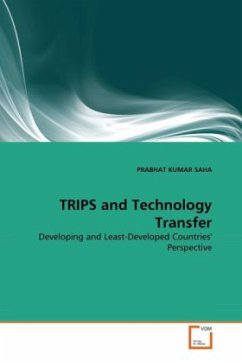
Ethiopia's Commitment to the TRIPS Agreement:
Will it have an overall Negative or Positive Impact on its S&T Policy?
Versandkostenfrei!
Versandfertig in 6-10 Tagen
32,99 €
inkl. MwSt.

PAYBACK Punkte
16 °P sammeln!
Currently, the impact of TRIPS implementation on the S&T policies of countries, especially in LDCs is hotly debatable. On one hand, strong protection of IPRs in general has argued to bring about increased flows of Foreign Direct Investment (FDI) and technology transfer to LDCs, and these changes in IPRs would also stimulate local innovation. While on the other hand, many argue that strong international IPR architecture, spearheaded the TRIPS Agreement, in LDCs such as Ethiopia not only blocks the transfer and dissemination of technologies, but also have an adverse impact on the national techno...
Currently, the impact of TRIPS implementation on the S&T policies of countries, especially in LDCs is hotly debatable. On one hand, strong protection of IPRs in general has argued to bring about increased flows of Foreign Direct Investment (FDI) and technology transfer to LDCs, and these changes in IPRs would also stimulate local innovation. While on the other hand, many argue that strong international IPR architecture, spearheaded the TRIPS Agreement, in LDCs such as Ethiopia not only blocks the transfer and dissemination of technologies, but also have an adverse impact on the national technological capability and ultimately on the overall science and technology development endeavours. The aim of this dissertation is therefore, to assess the overall impact of implementing strong TRIPS obligation on Ethiopian S&T Policy taking the core national technological capability enhancing schemes of the policy as the focus of the analysis.












